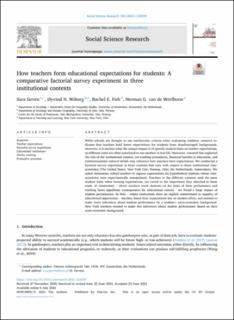| dc.contributor.author | Geven, Sara | |
| dc.contributor.author | Wiborg, Øyvind | |
| dc.contributor.author | Fish, Rachel E. | |
| dc.contributor.author | van de Werfhorst, Herman G. | |
| dc.date.accessioned | 2022-03-08T15:17:09Z | |
| dc.date.available | 2022-03-08T15:17:09Z | |
| dc.date.created | 2021-07-06T08:39:48Z | |
| dc.date.issued | 2021-10-06 | |
| dc.identifier.citation | Social Science Research. 2021, 100 1-20. | en_US |
| dc.identifier.issn | 0049-089X | |
| dc.identifier.uri | https://hdl.handle.net/11250/2983853 | |
| dc.description.abstract | While schools are thought to use meritocratic criteria when evaluating students, research indicates that teachers hold lower expectations for students from disadvantaged backgrounds. However, it is unclear what the unique impact is of specific student traits on teacher expectations, as different traits are often correlated to one another in real life. Moreover, research has neglected the role of the institutional context, yet tracking procedures, financial barriers to education, and institutionalized cultural beliefs may influence how teachers form expectations. We conducted a factorial survey experiment in three contexts that vary with respect to these institutional characteristics (The United States, New York City; Norway, Oslo; the Netherlands, Amsterdam). We asked elementary school teachers to express expectations for hypothetical students whose characteristics were experimentally manipulated. Teachers in the different contexts used the same student traits when forming expectations, yet varied in the importance they attached to these traits. In Amsterdam – where teachers track students on the basis of their performance and tracking bears significant consequences for educational careers – we found a large impact of student performance. In Oslo – where institutions show an explicit commitment to equality of educational opportunity – teachers based their expectations less on student effort, and seemed to make more inferences about student performance by a student's socio-economic background. New York teachers seemed to make few inferences about student performance based on their socio-economic background. | en_US |
| dc.description.sponsorship | This study was supported by the Netherlands Organization for Scientific Research (NWO) through a Veni grant awarded to Sara
Geven (#016.Veni.195.125) and a Vici grant awarded to Herman van de Werfhorst (#453-14-017). The research has also been
supported by the exchange professorship between the University of Amsterdam and New York University, offered to Herman van de
Werfhorist in 2016-2017. | en_US |
| dc.language.iso | eng | en_US |
| dc.publisher | Elsevier | en_US |
| dc.relation.ispartofseries | Social Science Research;Volume 100, November 2021, 102599 | |
| dc.rights | Navngivelse 4.0 Internasjonal | * |
| dc.rights.uri | http://creativecommons.org/licenses/by/4.0/deed.no | * |
| dc.subject | Teacher expectations | en_US |
| dc.subject | Factorial survey experiments | en_US |
| dc.subject | Educational institutions | en_US |
| dc.subject | Ability tracking | en_US |
| dc.subject | Evaluative processes | en_US |
| dc.title | How teachers form educational expectations for students: A comparative factorial survey experiment in three institutional contexts | en_US |
| dc.type | Peer reviewed | en_US |
| dc.type | Journal article | en_US |
| dc.description.version | publishedVersion | en_US |
| dc.rights.holder | © 2021 The Authors | en_US |
| dc.source.articlenumber | 102599 | en_US |
| cristin.ispublished | true | |
| cristin.fulltext | original | |
| cristin.qualitycode | 2 | |
| dc.identifier.doi | https://doi.org/10.1016/j.ssresearch.2021.102599 | |
| dc.identifier.cristin | 1920393 | |
| dc.source.journal | Social Science Research | en_US |
| dc.source.volume | 100 | en_US |
| dc.source.issue | 100 | en_US |
| dc.source.pagenumber | 1-20 | en_US |
| dc.relation.project | Nederlandse Organisatie voor Wetenschappelijk Onderzoek: #016.Veni.195.125 | en_US |
| dc.relation.project | Nederlandse Organisatie voor Wetenschappelijk Onderzoek: #453-14-017 | en_US |

